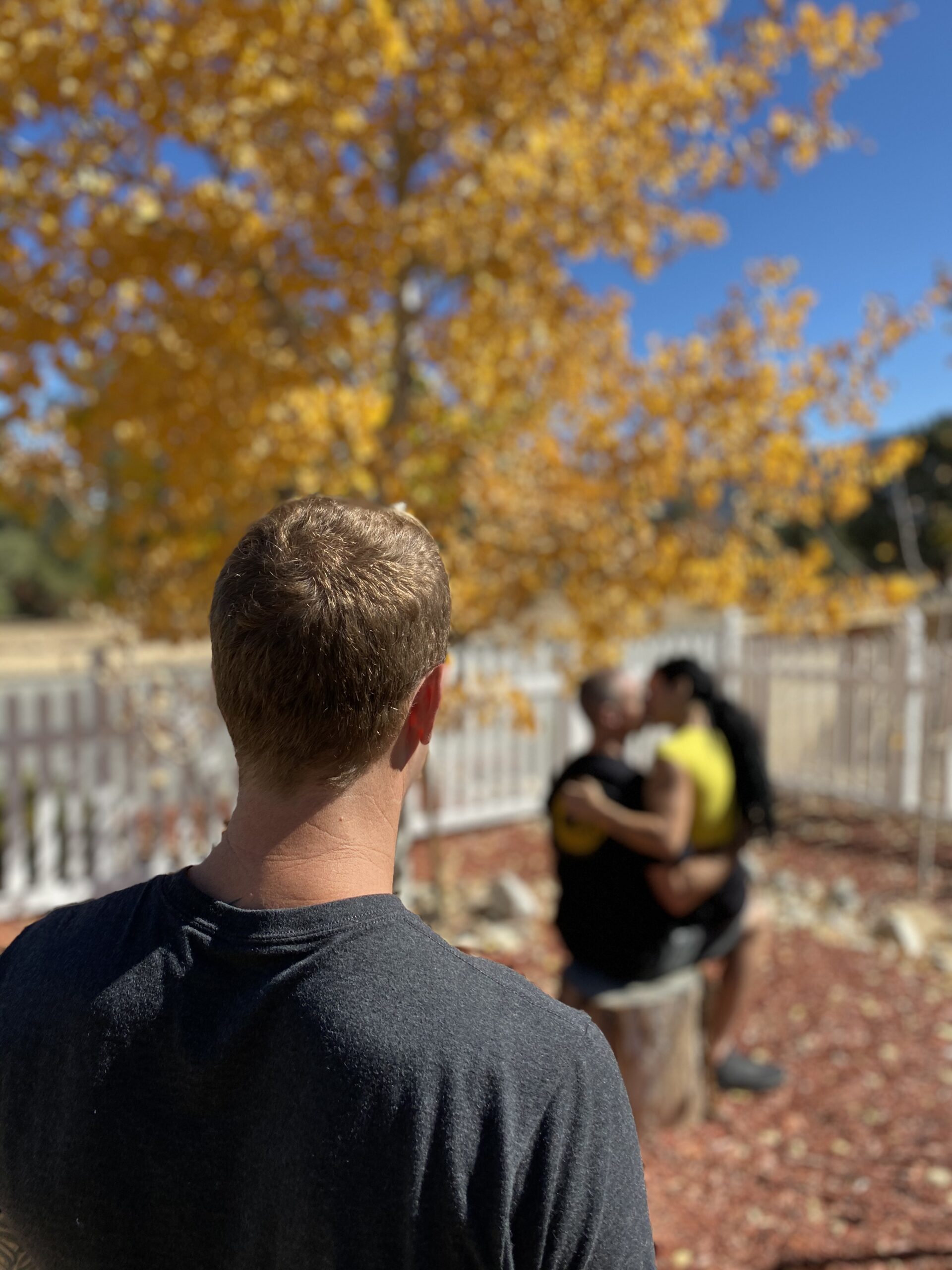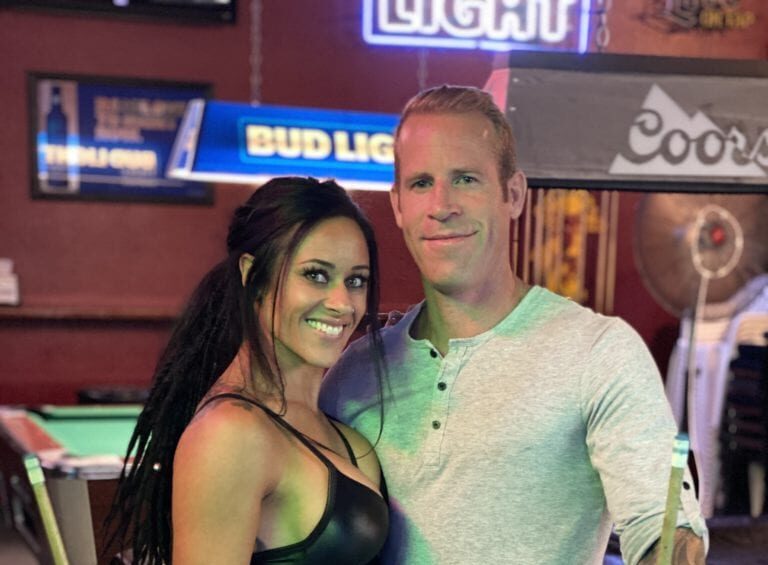Jealousy, one of the most misunderstood and volatile human emotions. Just like love, hate, anger, happiness, sadness etc., it’s a condition that is a regular part of our lives, and unless we learn to manage it, we can be destroyed by it. Jealousy has long been a wedge in our relationships, creating division, mistrust, and hurt feelings. I would go so far as to argue that jealousy is one of the most detrimental emotions to most relationships. Fortunately, for those that choose to look inward and address it, jealousy can be manipulated and tweaked. A person can change their perspective, view it from another angle, realize that nine times out of ten it’s a self-inflicted wound, and actually release the negative emotions associated with it. I’ll outline seven ways to deal with jealousy that has been effective in our ethically non-monogamous relationship.
One of the most common questions we’re asked about our unique relationship dynamic is, “How do you deal with jealousy?” This is an important question and the principles we use to navigate those feelings are applicable to any relationship whether ethically non-monogamous or not. The question of how do we manage jealousy is usually quickly followed up with an unsolicited admission where the person asking makes a statement something to the effect of, “I just know I couldn’t share” or even “I could never be ok with my spouse sleeping with someone else” I think most people would be surprised, that if they learned the source of their perceived discomfort, with some introspection and ability to face their own demons, they can also conquer this beast.
We can learn a lot about a subject just by having a closer examination of its definition. Let’s dissect what jealousy actually means and see how it applies to our relationships.

WHAT DOES IT MEAN?
- Feeling or showing suspicion of someone’s unfaithfulness in a relationship.
- Fiercely protective or vigilant of one’s rights or possessions
- Feeling or showing envy of someone or their achievements and advantages.
“Unfaithfulness in a relationship”… “One’s possessions”… “Envy of achievement”… YIKES! None of that sounds very positive or productive to a relationship. No wonder we’ve learned to despise this emotion, it’s capable of causing serious damage!
Feeling suspicious of one’s faithfulness attacks the very core of our relationships, trust and communication. It’s an ugly feeling and like most toxic emotions, it can grow in strength if a person continues to feed it. Think of your emotions like a pack of wolves that are in control of your life, some good and some bad. Whatever wolf gets fed is going to get bigger and stronger than the rest. Which wolves are you feeding your energy? Do you want your negative emotions becoming bigger and stronger than the positive ones? Choosing which emotions you feed is important, the obvious outcome being, whatever is being fed, will grow and be more formidable.
It’s interesting the word “possession” is used in the second definition. The standard narrative that was written on what a relationship should look like by society has long taught us to possess one another. We have been taught that it’s ok to claim a degree of ownership over one another. We’re taught it’s ok to tell one another what’s acceptable to wear, who we can talk to, and who we can hang out with. We’re told it’s ok to tell our spouses, boyfriends, and girlfriends what activities are ok to engage in, what tattoos or body modifications are acceptable, and what’s allowed on our social media accounts. To begin addressing jealousy within, start by looking at what you’ve been taught from without. It is critical to understand that many of the thoughts we have as they pertain to jealousy have been programmed into our thinking from the day we began this ride.
The definition of slavery is “a person who is the legal property of another and forced to obey them” That always hits close to home for me. How many marriages hold true to that definition? People enter a legally binding contract and tell one another what they are “allowed” to do with their life, rather than treating one another as the independent beings we are. How did this happen? I’ll tell you how, it happened because it’s easier for us to claim possession over one another and dictate our partner’s life rather than trusting each other to make the best decisions for the relationship. I don’t know about you, but this is my life and nobody will tell me how to live it, nor would I presume to hold ownership of anyone else’s life, including my wife’s. Claiming possession over another qualifies as a form of slavery, don’t hate the messenger, I’m just pointing out a fact that most would like to ignore.
A quote from my favorite Indian Mystic addresses this topic beautifully:

“If you love a flower, don’t pick it up. Because if you pick it up, it dies and it ceases to be what you love. So if you love a flower, let it be. Love is not about possession. Love is about appreciation.” -Osho
Feeling envy of someone’s achievements is listed as the third definition. Would you hold envy over your partner for their achievements? Whether that’s your spouse, a boyfriend/girlfriend, or casual friend; do you think it’s ok to be discontent with their accomplishments? Of course you don’t! However, create a certain set of circumstances and our old friend jealousy comes lurking in and tricks us into believing that’s acceptable behavior. Remember the wolf analogy? You can choose to feed the wolf jealous of someone’s achievements, or you can choose to feed the wolf of gratitude and celebrate their achievements. One will have a negative impact on your life and relationship while the other promotes strengthening your bond, the choice seems pretty clear to me.

ASK THE “WHY?”
One of my favorite interviews was our very first podcast. At one point, the host asked me, “How can you be ok with other men sleeping with your wife?” My response was simple, “Why would you not be ok with it?”
Before I go further, please don’t misunderstand what I’m saying; I don’t think ethical non-monogamy is for everyone. But everyone should at least ask themselves the same tough questions we have, regardless of monogamist values. And that is, what do you do when your spouse wants something that makes you feel jealous? Why don’t we have honest conversations with our partners on this topic prior to getting married? Why not address the fact that over the course of a lifetime together, we will inevitably cross paths with other amazing humans that we will have an uncontrollable attraction to, whether physically or mentally. It’s bound to happen! But instead, we write flowery vows, making promises of a life we’re going to lead together, tricking ourselves into thinking that one person can be the sole source of all our desires.
Back to the podcast interview… I dove deeper into his question and painted a very clear scenario. I asked “If your spouse came to you and expressed a desire to connect with someone else, whether that’s physically or emotionally, what would your response be?” He was baffled, and couldn’t come up with an answer to the question that didn’t end in using the word jealousy.
The key to this question is recognizing one fact; your spouse is expressing a desire for something in his/her life. Whether you want that for him/her or not is irrelevant, they expressed a desire for it, it’s their desire and they’re allowed to desire whatever they want out of life. If that caused a jealous emotion in you, ask yourself why? Why am I feeling jealous that my partner desires a connection with someone else? Is it because it makes you feel inadequate? Does it make you worry they will leave you for someone else? Are you afraid someone else will be better than you? Are you afraid it will spiral out of control? Are you afraid of what others will think? Once you answer the why to your initial reaction, ask the why again!
Why does it make you feel inadequate? Why do you fear they will leave you for someone else? Why are you afraid others will be better than you? How will it spiral out of control? Why does it matter what others think?
afraid others will be better than you? How will it spiral out of control? Why does it matter what others think?
Once you have that answer… you guessed it, ask the why again! Continue asking yourself “why?” anytime your response isn’t concrete. If you’re being honest with yourself, most times your answer will be found in one of a few words: jealousy, ego, pride, insecurity, or fear.
This doesn’t only apply to those in the lifestyle; it’s the same across the board! If something bothers you and triggers a jealous emotion, simply stop what you’re doing and ask yourself why. The catch is, you can’t answer yourself with an ambiguous response. Saying things like, “Because it makes me uncomfortable” or “Because I don’t like it” doesn’t get to the source of the problem. It’s a cop out, you’re cutting corners to avoid ugly truths and you aren’t taking ownership of your own feelings, don’t do that.

COMMUNICATE FEARS
We all have fears related to our relationship. Fear of not being enough, fear of other’s becoming a wedge, fear of the judgment, or even fear of the unknown. Far too long we’ve been taught to repress our fears, to keep quiet about them, and just hope they are never realized.
Aubrey and I have found it’s best to discuss our worst fears openly. To expose them, analyze them, and see just how much of what we fear is rational.. For example, the possibility that we’d fall more in love with someone else was a fear we both shared initially. After all, we have a life together, a child, a home, family, etc. What if we allow something into our relationship that could destroy it? All it takes is reminding ourselves we have such an amazing relationship, the idea that we could find something better literally makes us chuckle, there’s no way. Communicating this fear helped explain the reasons why that could never happen and removed the thought from our minds and we were able to view things more rationally. We often tell one another how strong our relationship is, but until it’s tested, how could we really know?
Communicating fears also gives our partner a heads up to be more aware of them, and help us process those emotions together. I’ll be honest; I grew up a late bloomer in the era of Rambo, Predator, Bloodsport, and Conan. Muscle bound men were action heroes I aspired to be, unfortunately, my genetics have always had me on the leaner end of the spectrum and as a result, I used to have a bit of a size insecurity. Fast forward to adulthood, my insecurities remained and were every bit as hard to deal with. Guys vying for Aubrey’s attention that were bigger and stronger than myself made me uncomfortable. I was afraid Aubrey would like something they had better than me. First I asked myself the why and it sounded like this:
- Aubrey being with men that are physically larger and stronger makes me uncomfortable…. Why?
- Because I don’t want her to think I’m weak… Why does that matter?
- Because I always want to be the best she’s had and I’m afraid she will like them better… Why?
- Because I want to be the biggest, strongest man she’s been with… Why?
- Because I’m insecure and jealous. She loves me just the way I am, I should recognize that.
- My problems, not hers… ouch.
It’s that easy folks. Once I was able to walk through my fear step by step with her and give an idea of where that insecurity stems from, I was able to conquer my own demons. And knowing what I was dealing with internally, she was able to be supportive and assist me with that growth rather than be left in the dark and not understand. She was able to put the fear to rest by assuring me that nothing had with anyone else, compares to what we share together, bigger muscles or not. Communicate your fears with your partner, they can help you grow.
REMIND YOURSELF WHY YOU’RE TOGETHER
 So often we get caught up in the things that make us uncomfortable that we forget to mind the things that make us feel good. When you’re feeling jealous about something, pause, redirect your emotions away from the negative and seek the positive. Why are you together? We’re given one shot at this life and you hitched your wagon to someone else’s. Surely there has to be some good reasons why you’ve made that choice?
So often we get caught up in the things that make us uncomfortable that we forget to mind the things that make us feel good. When you’re feeling jealous about something, pause, redirect your emotions away from the negative and seek the positive. Why are you together? We’re given one shot at this life and you hitched your wagon to someone else’s. Surely there has to be some good reasons why you’ve made that choice?
Being mindful of the reasons you are together is a great way to combat negative emotions. Jealousy is a sneaky, insidious emotion and it pounces when it detects you are unhappy or worried. It capitalizes on your internal dissonance and feeds the wolf of despair and hopelessness. Much like a hungry lion on the African plain, jealousy looks for an easy target and attacks those in a weakened state. Keep your mind healthy; keep your relationship feeling fresh! Don’t allow jealousy a foothold in your life by presenting it an opportunity to strike while you’re weak.
Talk to each other often about the life you’ve shared together, about your accomplishments, about the special moments and love you share. Sometimes all we need a little reminder from our spouse that they chose us and continue to choose us because they want to, not because they have to. It’s much harder for sneaky ol’ jealousy to wiggle its way into a healthy, positive relationship.

GIVE YOUR TRUST, DON’T WRITE A FALSE NARRATIVE
Often we get in the habit of writing a narrative in our own mind about a situation and letting our imaginations run wild. If you’re feeling jealous about something, the best thing you can do is address it. Be civil, expressive, and communicative with your partner on why you’re feeling jealous and work through it together.
Holding onto your jealous emotions and not discussing them allows your mind the freedom to conjure up whatever worst case scenario you may be imagining and make it real. You’ll rethink, and relive that emotion over and over in an endless loop of agony because you’re telling your mind a story and it believes you. Physiologically, your body responds to your thoughts the same whether they are true or made up in your own mind. Negative emotions and a misguided jealous narrative causes your body to release cortisol and you feel the weight of stress descend.
Why do this to yourself? Rather than retreating inwardly with your thoughts and allowing your imagination to take the wheel, trust in your partner. Trust that they will do the right thing for you and your relationship, deal with what’s real and not with what you fear could be real.
I’m sure there are those reading this that are throwing their hands up in the air because trust has already been compromised in the relationship. They’re wondering, ”How can I trust this person? He/she has already shown a propensity for being untrustworthy” If that’s the case, jealousy is not your worst problem. Trust and communication are the backbones to any relationship, without them, any of our emotional vices are problematic. Before you can address jealousy, you must first find trust.
CAN NEVER CHECK IN TOO MUCH
It never hurts to check in with your partner and see how they are feeling. To either ask if they are feeling jealous about anything or to express jealous feelings you may have. I’ve harped on communication from the beginning, but I truly can’t express how important it is.
It feels good to know Aubrey is concerned with my emotions. To know that she’s aware jealousy is an emotion that affects us all, and to check in with me from time to time. She’ll simply say, “How are you feeling babe? Am I doing right by you? Is there anything that makes you uncomfortable? You know I always want you to be happy.”
She inquires about my feelings, asks if there’s anything she can do to make me feel better, and reaffirms that my happiness is paramount. This makes me feel confident in our relationship and valued as her partner. We routinely take the time to consider each other’s feelings and view them empathetically rather than selfishly. The strength in that has been one of the greatest keys to our continued success.
CHOOSE COMPERSION
Another word I find value in is compersion. It means an empathetic state of happiness and joy experienced when another individual experiences happiness and joy. In other words, finding happiness in your partner’s happiness. Compersion is truly selfless, it places the desires of your spouse above your own, and it’s the greatest weapon you can wield against jealousy. Because if you are able to find joy in the things that bring your spouse happiness, jealousy is obsolete.
Think about it, compersion is literally the antithesis to jealousy. Rather than wanting to possess, control, feel suspicious or envy, a person can feel joy, happiness, elation, and security by things that would normally cause jealous feelings.
Back to the example of insecurity I had regarding bigger stronger guys, finding compersion was instrumental in rectifying that negative emotion. I was able to realize Aubrey is only going to spend time with people she wants to spend time with, regardless of their size. If she happens to meet some muscle bound stud and wants to spend time with him, she’s doing it because she wants to, she’s satisfying a desire she has, and that makes me happy.
Why would I ever claim possession over her life and tell her she isn’t “allowed” to do something?
Why would I ever prevent her from achieving something she desires if it doesn’t take away from us?
Why would I allow self-inflicted wounds like jealousy prevent her from experiencing all she wants to experience for her life?
On the contrary, the freedom we’ve discovered only serves to strengthen our bond, it doesn’t diminish it one bit. At the end of the day, seeing our spouses happy is what should matter the most. If that’s our goal each day then everything else falls into place, practice compersion.
FLIP IT ON ITS HEAD

Something else to consider, a dash of jealousy isn’t always a bad thing! It keeps us aware, and it’s a reminder that when we stop putting effort into our relationships, someone else would happily pick up the slack. Don’t interpret this as threat to be constantly concerned with, that’s not healthy either and can lead you down a dark path. Rather, simply recognize that fact, and renew your motivation to maintain a healthy relationship so that jealousy isn’t a threat to yours.
If anything, a bit of jealousy should serve as a motivator not to get complacent or lazy in your relationship. That nervous feeling you get in your stomach, the tightness in your chest, and accelerated heart rate you experience when jealousy occurs, should serve as a reminder that nothing is permanent. Regardless of how amazing your relationship is, if you get complacent with it, things could deteriorate. Look inward and tune-in to yourself, notice these physiological queues as reminders. Choose not to perceive those feelings as bad, but as mechanisms to help keep you on a positive trajectory. Jealousy doesn’t need to be feared when you’re in control, just like any emotion, it should be a teacher
In closing, jealousy is one of the nastiest emotions and is capable of doing tremendous damage if it’s not put in check. Fortunately, if we can learn to analyze the root of the emotion and get to the source of discomfort, it can be managed and also used to give us further understanding of ourselves.
First, realize that what society has taught you about jealousy isn’t the only way to perceive it. Ask yourself the “why” and identify the source of your discomfort. Communicate your fears with your partner, there’s no reason you should have to tackle these problems by yourself, your spouse can be a tremendous help. Remind yourself why you’re together, combat negative emotions with positive ones, feed the wolf you want to grow. Check in with one another, even when things seem great, you can never go wrong by simply asking your partner how they are feeling. Choose compersion, find happiness in one another’s happiness and watch how jealousy loses it’s power over your relationship. And lastly, flip it on its head. Use jealousy as a teacher rather than an enemy, it can educate us about ourselves and expose ugly truths within. Once exposed, we can then attack the source.
We are the captains of our ship and the masters of our destiny. We don’t always choose when an emotion like jealousy will rear its ugly head, but if we are equipping ourselves with tools of understanding, we can do an honest evaluation of our own true feelings. This allows us to be less emotionally reactive, and more analytical in our approach to solving the problem.


